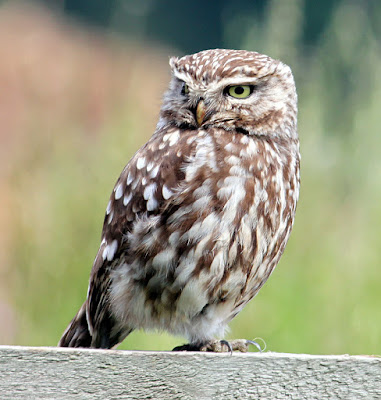Some news from Europe about the Little Owl, Athene noctua, sýček obecný, recently chosen by the Czech Society for Ornithology as their “Bird of the Year”.
Though common in Europe, Northern Africa, parts of the Middle East and Asia, population numbers of the owl fell significantly over the last half century in the Czech Republic, as birds disappeared from farmland areas; as a result the Little Owl is on their endangered list.
The Czech Society for Ornithology wants to make the public aware of the bird’s plight and that population numbers of the once widespread species fell dramatically over recent decades.
Little Owl
The society’s Martin Šálek: “We chose the Little Owl because this is an owl which not long ago was very common and widespread. We wanted to reveal the plight of the bird and other animals which live in the vicinity of arable land, where bird and other population levels have dropped.
“At the beginning of the last century the Little Owl was widespread; today it is on the edge of extinction. We wanted people to know about the danger.”
Little Owl
According to Mr Šálek, there used to be tens of thousands of breeding pairs but by the 1970s the numbers had dropped around just 2,000.
“At present the population is tiny: we have counted around 130 nesting pairs. They are limited to small areas of land around the country; whereas 30 years ago the owl was a common sight for our grandparents, now they are only located in isolated areas or “islands” of land primarily in the regions of Ústí, Central Bohemia and South Moravia.”
One question is whether there are steps the public can take to help; the Czech Society for Ornithology’s Martin Šálek points out even simple steps can make a difference.
“Our Little Owls have retreated from farmland into inhabited areas where they face numerous dangers. We studied where most of the Little Owls died and learned that some 40 percent died in so-called technical ‘traps’. These include barrels of water, or upright pipes that are not capped.
“The owls are curious by nature and go inside to have a look and get stuck and can’t get out. For that reason, it would be good if all small cottage or garden colony owners who have rain barrels remember to but a float inside, so the bird can climb up and escape.Another thing each of us can do is to help the Little Owl is leave a patch of uncut grass on our property, so insects like butterflies which are part of the bird’s diet can remain and hide. A well-trimmed English lawn is not beneficial. If you leave 20 percent uncut, that can help.”
Little Owl
This account from Czechoslovakia mirrors the story of the UK population of Little Owls. The BTO’s Common Bird Census/Breeding Bird Surveys trend for Little Owl in the UK shows very wide variation, but a downturn in recent decades suggests that a rapid decline lies behind the observed fluctuations.
A figure of c. 7,000 pairs from the BTO/Hawk & Owl Trust's Project Barn Owl (Toms et al. 2000) was the first replicable population estimate for Little Owls in the UK. An independent BBS estimate is for c5,700 pairs in 2009, since when a substantial further decrease has occurred.
Little Owl
The primary drivers for this rapid decline are thought to be decreased juvenile survival and the effects of agricultural intensification.
Little Owl - British Trust for Ornithology
My own observations over the past 35 years in this part of Lancashire have seen the once very, very common Little Owl become something of a scarcity. Once regular sites are now abandoned with few localities where the species may be found on a regular basis.
The Little Owl is now so scarce, so infrequent that it is something of target bird for listers, twitchers and toggers at all times of the year. Where breeding localities are known by fieldworkers concerned for the species’ welfare, the locale has to be kept hush-hush so as not to subject the birds to constant and often unsympathetic attention.
Little Owls
I understand that the BTO are looking to undertake a new national survey of the Little Owl quite soon. The way things look at the moment this could lead to the Little Owl being identified as at least Red-listed, if not endangered. Let’s hope not.




































